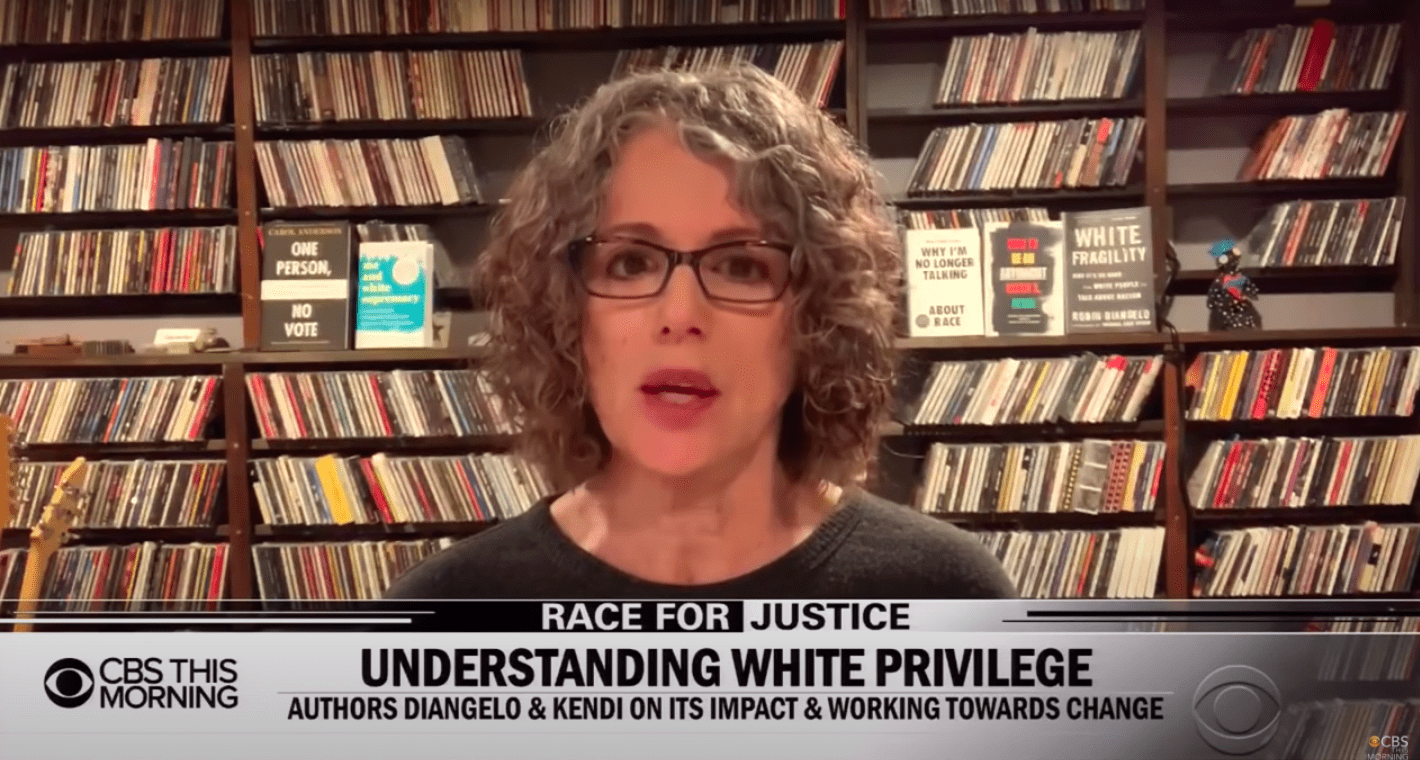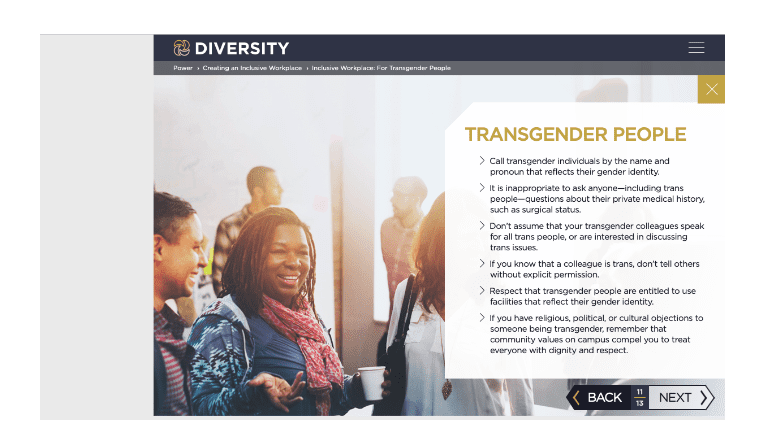Therapeutic Totalitarianism In Academia

A reader writes:
I don’t know if you remember me, but you posted a blog last year based on an email I sent you about totalitarian things I’ve seen at my university.As with last time, if you post anything I share, please keep both my name and university confidential, as I am supporting a wife and a large family, and cannot risk getting doxed at my job. My income is dependent on receiving external grants, and in today’s climate I would lose any chance of maintaining my funding and student recruiting if my thought crimes were made public.
You’ve been talking a lot recently about the sudden increase in activism regarding forcing people to use preferred pronouns. I thought you’d appreciate seeing screen grabs from the most recent online training that I took at my (public) university. I’ll briefly contextualize each of the five pictures I’m attaching:

1) You can see they are now explicitly stating that their goal is equality of outcome (equity), not equality of opportunity (equal treatment). They are quite vague regarding how exactly to “proactively correct historical power imbalances,” but given that all universities are already doing everything in their power to recruit under-represented minorities (URMs) and still failing to meet their identity quotas, you can bet your bacon that some sort of tyranny and rampant discrimination will be required.

2) Look at the first and last bullet points here in particular. The first: “Call transgender individuals by the name and pronoun that reflects their gender identity.” I have no issue with the “name” part, but look how they are also forcing us to use their preferred pronoun. They could have kept the peace by saying “name or pronoun,” as calling somebody by their preferred name would not violate my Christian conscience, but of course there can be no compromise here. I refuse to use a non-biological gender pronoun, for the exact same reason that I would refuse to call an anorexic person overweight, which makes me wonder how long I will be able to stay here before the issue is forced. And then look at the last bullet point: “If you have religious, political, or cultural objections to someone being transgender, remember that community values on campus compel you to treat everyone with dignity and respect.” I actually agree with this statement on the face of it, but you must remember that they are subtly redefining “dignity and respect” to mean using their preferred pronouns. It’s a brilliant rhetorical bait and switch and shows the power of clever language.



3-5) A video is played of a coworker complaining about having to call a trans person by their preferred pronoun. We’re now given a choose-your-own-adventure, where we can pick between three different ways to respond. Now this is where things get really fascinating: if you pick the politically incorrect choice, the training does show the actor saying the quote you selected, but then the video suddenly pauses, a narrator says that this response is not acceptable, and then rewinds the tape to bring you back to the same choice again. It keeps doing this until you pick the one correct choice. For example, on the second round of choices, if you selected “I see what you’re saying, and I agree that you should be able to refer to people according to your beliefs…” it literally rewinds (i.e. erases) what you are saying and makes you try again.In summary, it is now the official position of my university that we must forcibly achieve equality of outcome amongst all identity groups, and that we are all compelled to use non-biological gender pronouns against our own beliefs. Totalitarianism is not just a foreboding specter on the horizon, it’s already here, and it’s coming out of hiding into plain sight now that it’s accrued enough of a consensus amongst the elite class.

This is one of those cases where both sides are going to assume there’s a lot more going on beneath the surface and, like I said, are going to be disinclined toward actually reading the available evidence. Thankfully, the court brief is fairly exhaustive and–importantly–the account provided in the brief has received the approval of both plaintiff and defendant. To stress, everyone involved in this case agrees, legally, that the account provided herein is an accurate picture of what happened. Additionally, we also have audio of the initial microaggression seminar (Mr. Bhattacharya’s comments start at around the 28:30 mark), as well as of the pursuant committee meeting that ended in his expulsion.
Here is the initial exchange, as documented by the brief:
Bhattacharya: Hello. Thank you for your presentation. I had a few questions just to clarify your definition of microaggressions. Is it a requirement, to be a victim of microaggression, that you are a member of a marginalized group?
Adams: Very good question. And no. And no—
Bhattacharya: But in the definition, it just said you have to be a member of a marginalized group—in the definition you just provided in the last slide. So that’s contradictory.
Adams: What I had there is kind of the generalized definition. In fact, I extend it beyond that. As you see, I extend it to any marginalized group, and sometimes it’s not a marginalized group. There are examples that you would think maybe not fit, such as body size, height, [or] weight. And if that is how you would like to see me expand it, yes, indeed, that’s how I do.
Bhattacharya: Yeah, follow-up question. Exactly how do you define marginalized and who is a marginalized group? Where does that go? I mean, it seems extremely nonspecific.
Adams: And—that’s intentional. That’s intentional to make it more nonspecific … .
After the initial exchange, Bhattacharya challenged Adams’s definition of microaggression. He argued against the notion that “the person who is receiving the microaggressions somehow knows the intention of the person who made it,” and he expressed concern that “a microaggression is entirely dependent on how the person who’s receiving it is reacting.” Id. He continued his critique of Adams’s work, saying, “The evidence that you provided—and you said you’ve studied this for years—which is just one anecdotal case—I mean do you have, did you study anything else about microaggressions that you know in the last few years?” Id. After Adams responded to Bhattacharya’s third question, he asked an additional series of questions: “So, again, what is the basis for which you’re going to tell someone that they’ve committed a microaggression? … Where are you getting this basis from? How are you studying this, and collecting evidence on this, and making presentations on it?”
You can listen to the audio if you like. There’s nothing there, in my opinion, that is not captured accurately in the written description. Bhattacharya does not yell or raise his voice. He sounds skeptical, but in no way violent or threatening. Nor does Adams, the presenter, signal that she is experiencing anything that approaches fear or trauma.
But you know what happened next. Eventually:
This meeting found that Bhattacharya’s continuing behaviors were proof that he posed an imminent danger to the campus community, although the committee did not bother to explain what those behaviors entailed. His behavior was simply noted as “unusual” and this was proof that “Any patient that walked into the room with [Bhattacharya] would be scared.” The following day, Bhattacharya was forcibly removed from campus and told he could not return until he had been screened. He was, subsequently, not allowed to receive sanctioned screening, because of his status of having been removed from campus after being deemed a security risk.
Again, none of what I have described is an exaggeration. None of these details are even being contested.
Now for my own conjecture: the problem isn’t that anyone genuinely believes Bhattacharya poses a threat to anyone’s safety. The problem is that he attempted to question the ideological firmaments of contemporary anti-racist training. These firmaments are protected with aggressive viciousness precisely because they cannot withstand scrutiny. Had Bhattacharya merely scoffed at them, or even if he had been outright condescending and dismissive, he probably would not have received such a severe punishment. The problem was that he was right, and his accusers knew it.
But what most concerned her was an upcoming diversity training in which faculty and staff would be divided into white and nonwhite “caucuses.” In the wake of George Floyd’s death and the protests that then erupted all over the country, LWTech had, like so many other educational institutions, embarked on a large, highly visible attempt to make itself a more inclusive, less racist place. The session was a part of that. It was called Courageous Conversations, and it was scheduled for June 19.
The stated goal of such events is to allow people to talk about race and racism more openly, but the decision to have the races meet separately made Parrett uncomfortable. “Racial segregation of that kind seems like a throwback to the pre-1960s and not a good way to create any kind of cooperation or collaboration,” she says. She wasn’t the only one disturbed by the idea of a racially segregated anti-racism training. Her friend Phil Snider, another English professor at LWTech, said in an email to senior administrators that a “conference based on segregation by skin color does nothing to build a community of belonging.”
Nonetheless, a June 18 all-college email noted that the school’s president, Amy Morrison, had “made clear the expectation that all full-time employees attend Friday’s Courageous Conversations” unless they had conflicting teaching responsibilities. Parrett decided to express her qualms about the training during the training itself.
What happened over the next nine months was both bizarre and oppressive. Because of a brief disruption that easily could have been brushed aside or handled with a warning not to do it again, LWTech went to war against a tenured faculty member, launching a cartoonishly over-the-top disciplinary process that included the hiring of a private investigator, dozens of interviews, and claims of widespread trauma.
You can hardly fathom the Soviet-quality degree of ideological and bureaucratic fanaticism university officials put this professor through. Singal documents it all, then puts it in context of how these Social Justice berserkers criminalize disagreement by framing it all as aggression. Singal:
In this worldview, everything is a harm. There is no such thing as legitimate political disagreement, because we (the progressive in-group) already know the correct answer to every question (even if the answer can sometimes change overnight), and anyone who disagrees clearly—clearly—does so not because of some well-founded political or philosophical difference but because that person wants to harm the innocent people we are righteously hellbent on protecting. There is literally no other explanation for such a difference of opinion, and it doesn’t matter whether the opinion being denounced is held by the majority of Americans.
It is simply toxic to treat mainstream disagreement about political issues as harmful and worthy of discipline. Yet in some circles, this style of zealotry is not just present but escalating.
Read it all. This is therapeutic totalitarianism. You think it’s not going to happen to you. What happens in the university today will happen in corporations and other institutions tomorrow.
Eventually this will burn itself out, but not after it has burned down institutions and destroyed many lives. Read Live Not By Lives to better understand how you can prepare to face this down. One thing that’s not in the book, but that you should consider: lawyer up, and sue these corrupt institutions into the ground.